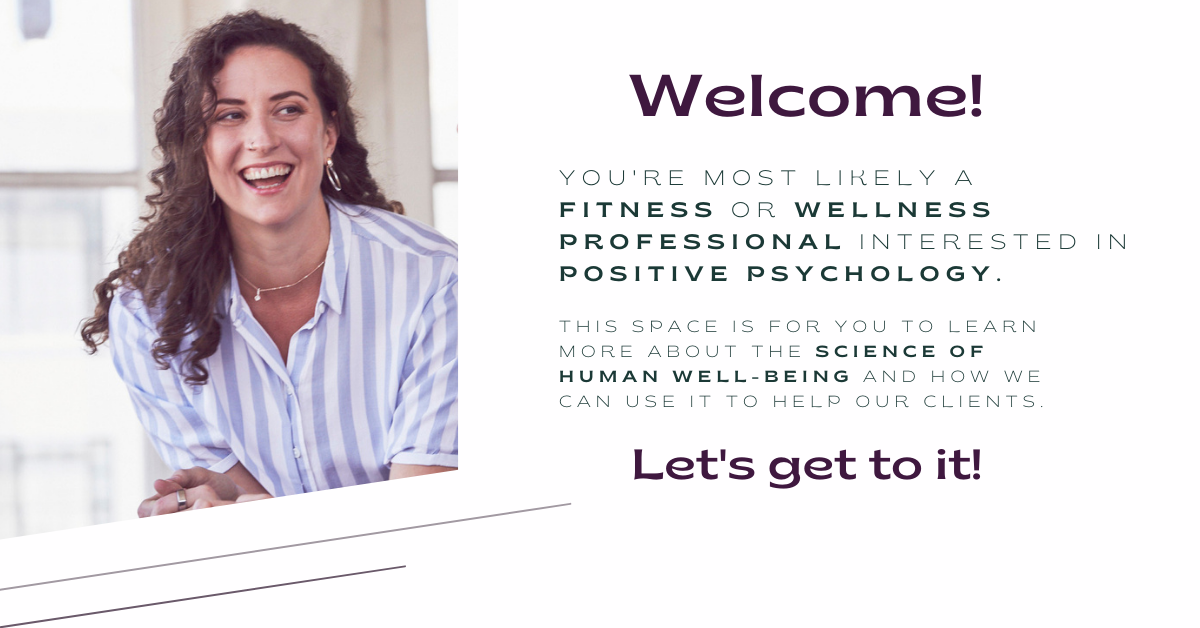Fitness, Wellness, & Wellbeing
What is Positive Psychology?
Positive Psychology is the scientific study of human well-being. It’s also been called the “science of happiness” and the “science of human flourishing. To put it another way, it’s a study of what makes life worth living.
It’s a relatively new domain of psychology. In 1998, when Martin Seligman was president of the American Psychological Association, he called for a formal commitment in the field of psychology to study what’s right with people.
Pretty cool, huh?
The field of positive psychology scientifically looks at things like grit, determination, resilience to stress, the nature and benefits of positive emotion, flow and engagement, how to leverage our strengths to overcome challenges and build motivation, feeling accomplishment, and how to build lives of vitality and zest.
As fitness and wellness professionals this is right up our alley.
Who am I in all this?
Hi, my name is
Darlene Marshall
…and I’m one of the few fitness professionals in the world with a formal education in Positive Psychology.
I’ve been working in fitness since 2011, the first 8 years for an international, luxury fitness brand as a Certified Personal Trainer. I’m a Certified Wellness Coach, Nutrition Coach, and yoga teacher with additional training in sleep, meditation, mindfulness, behavior change, and a bunch more.
In 2020 I earned my Master’s degree in Applied Positive Psychology from the University of Pennsylvania. The “applied” here means we look at the body of research and become the carriers for bringing that science out into the world.
Let me ask you this…
You go to the doctor when you’re physically sick…
You go to the psychologist, therapist, or psychiatrist to treat mental health challenges…
But, where do any of us go if we want to learn how to THRIVE?
That is a core question of Positive Psychology. How do we share the science of well-being if it’s all about what’s right with people?
I think there’s an untapped answer…
Fitness & Wellness Professionals can be Ambassadors of Wellbeing
As fitness professionals we have the most hours of time spent with our clients.
More than their primary care physicians…
More than their therapists…
More than their physical therapists…
(…sometimes even more than their spouses.)
Fitness & Wellness Professionals also have a unique lens:
We focus on building healthful behaviors. Movement, nutrition, sleep, meditation, mindfulness. We have so many tools to help our clients build fitness and health.
But what if we expanded our focus?
What if we set out to help our clients learn to flourish!?
This page has resources for you to learn about Positive Psychology and tools to support you in the fitness industry:
Downloadable white papers with information and application tools
Scientific references from recent speeches
A discounted rate on my book Personal Trainer and Wellness Coach
I hope you find them helpful.
Conference sale price!
Get your copy of Personal Trainer and Wellness Coach for over 50% off the regular price for digital download.
People have long sought to care for themselves, but the newest trends in fitness aren't about getting better abs or fad diets - they're how to optimize wellness, self care, and well-being. As your skillset evolves so should your business. Personal Trainer and Wellness Coach is your guide to evolving your fitness business - whether you're a personal trainer, health coach, group fitness instructor, or other lifestyle practitioner looking to seamlessly blend offerings.
If you want a financially stable, ethical, long-term career in fitness and wellness this book is your next step in evolving yourself and your offerings.
Tools to Go Deeper:
Dive further into your learnings with these free quick guides:
CANFITPRO 2022 Handout
References from Recent Speeches
Evidence-based practice means having actual evidence!
Here are the references from recent speaking engagements:
Positive Emotions & Upward Spirals
Fredrickson, B. L. (2013). Positive emotions broaden and build. In Advances in experimental social psychology (Vol. 47, pp. 1-53). Academic Press.
Fredrickson, B. L., Arizmendi, C., & Van Cappellen, P. (2020). Same-day, cross-day, and upward spiral relations between positive affect and positive health behaviours. Psychology & Health, 36(4), 444-460.
Fredrickson, B. L., & Joiner, T. (2002). Positive emotions trigger upward spirals toward emotional well-being. Psychological science, 13(2), 172-175.
Fredrickson, B. L., & Joiner, T. (2018). Reflections on positive emotions and upward spirals. Perspectives on Psychological Science, 13(2), 194-199.
Garland, E. L., Gaylord, S. A., & Fredrickson, B. L. (2011). Positive reappraisal mediates the stress-reductive effects of mindfulness: An upward spiral process. Mindfulness, 2(1), 59-67.
Kok, B. E., Coffey, K. A., Cohn, M. A., Catalino, L. I., Vacharkulksemsuk, T., Algoe, S. B., ... & Fredrickson, B. L. (2013). How positive emotions build physical health: Perceived positive social connections account for the upward spiral between positive emotions and vagal tone. Psychological science, 24(7), 1123-1132.
Yemiscigil, A., & Vlaev, I. (2021). The bidirectional relationship between sense of purpose in life and physical activity: a longitudinal study. Journal of Behavioral Medicine, 44(5), 715-725.
Motivation and Behavior change
Deci, E. L., & Ryan, R. M. (2008). Self-determination theory: A macrotheory of human motivation, development, and health. Canadian psychology/Psychologie canadienne, 49(3), 182.
Gillison, F. B., Rouse, P., Standage, M., Sebire, S. J., & Ryan, R. M. (2019). A meta-analysis of techniques to promote motivation for health behaviour change from a self-determination theory perspective. Health psychology review, 13(1), 110-130.
Patrick, H., & Williams, G. C. (2012). Self-determination theory: its application to health behavior and complementarity with motivational interviewing. International Journal of behavioral nutrition and physical Activity, 9(1), 1-12.
Hancox, J. E., Quested, E., Ntoumanis, N., & Thøgersen-Ntoumani, C. (2018). Putting self-determination theory into practice: Application of adaptive motivational principles in the exercise domain. Qualitative Research in Sport, Exercise and Health, 10(1), 75-91.
Hutchison, A. J., Breckon, J. D., & Johnston, L. H. (2009).;
Bridle, C., Riemsma, R. P., Pattenden, J., Sowden, A. J., Mather, L., Watt, I. S., & Walker, A. (2005)
Sheldon, K. M., & Houser-Marko, L. (2001). Self-concordance, goal attainment, and the pursuit of happiness: Can there be an upward spiral?. Journal of personality and social psychology, 80(1), 152.
Van Cappellen, P., Rice, E. L., Catalino, L. I., & Fredrickson, B. L. (2018). Positive affective processes underlie positive health behaviour change. Psychology & health, 33(1), 77-97.
Vlachopoulos, S. P., Kaperoni, M., & Moustaka, F. C. (2011). The relationship of self-determination theory variables to exercise identity. Psychology of sport and exercise, 12(3), 265-272.




